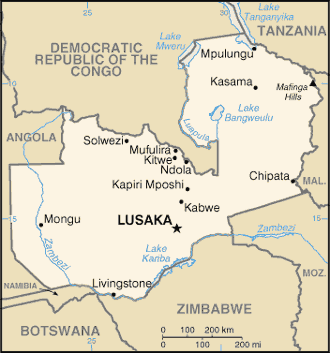 Zambia,[a] officially the Republic of Zambia,[b] is a landlocked country at the crossroads of Central, Southern and East Africa.[8] It is typically referred to being in South-Central Africa or Southern Africa. It is bordered to the north by the Democratic Republic of the Congo, Tanzania to the north-east, Malawi to the east, Mozambique to the southeast, Zimbabwe and Botswana to the south, Namibia to the southwest, and Angola to the west. The capital city of Zambia is Lusaka, located in the south-central part of Zambia. The population is concentrated mainly around Lusaka in the south and the Copperbelt Province to the north, the core economic hubs of the country.
Zambia,[a] officially the Republic of Zambia,[b] is a landlocked country at the crossroads of Central, Southern and East Africa.[8] It is typically referred to being in South-Central Africa or Southern Africa. It is bordered to the north by the Democratic Republic of the Congo, Tanzania to the north-east, Malawi to the east, Mozambique to the southeast, Zimbabwe and Botswana to the south, Namibia to the southwest, and Angola to the west. The capital city of Zambia is Lusaka, located in the south-central part of Zambia. The population is concentrated mainly around Lusaka in the south and the Copperbelt Province to the north, the core economic hubs of the country.
From Wikipedia
Food, water, land and health
-
The International Food Policy Research Institute (IFPRI) provides research-based policy solutions to sustainably reduce poverty and end hunger and malnutrition in developing countries. Established in 1975, IFPRI currently has more than 600 employees working in over 50 countries. It is a research center of CGIAR, a worldwide partnership engaged in agricultural research for development.Intl. Food Policy Research Institute (IFPRI)
-
The Global Health Observatory theme pages provide data and analyses on global health priorities. Each theme page provides information on global situation and trends highlights, using core indicators, database views, major publications and links to relevant web pages on the theme.WHO Global Health Observatory
-
The DHS Program provides decision makers and program managers with the information necessary to plan, monitor and evaluate population, health, and nutrition programs.USAID Democratic and Health Surveys
-
UNAIDS is leading the global effort to end AIDS as a public health threat by 2030 as part of the Sustainable Development Goals.UN Aids
-
Free online database and additional resources of health and human rights law.Health and Human Rights resources
-
The UN World Health Organisation regional offices in Africa. WHO Regional Offices in Africa
Other data and statistics
-
The Global Infrastructure Hub aims at connecting the global infrastructure community and sharing insights to facilitate delivery of G20 members’ economic, social and environmental outcomes through more and better infrastructure. The GI Hub works with public and private sectors globally to increase the flow and quality of infrastructure projects around the world. We share data, knowledge and leading practices, and help the public and private sectors work more closely to deliver crucial public infrastructure projects.Infrastructure Knowledge Exchange
News about Zambia
Showing 4 headlines from the past two days
